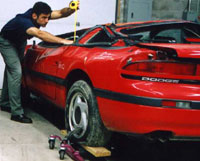

I graduated high school in 1990 and attended the University of Western Ontario in London from 1990 to 1994. I graduated with a Bachelor degree in Physics with a year of Medical Biophysics during that time. I also completed a few Masters of Engineering courses related to Traffic Engineering at Ryerson University in 2001-2003. Over the course of my career, I've taken several physics and engineering-related courses pertaining to the field of forensics.

I enjoyed physics during high school and university and was hoping to enter a field where I could use my background. Many physics-related careers are in academia and I was hoping for an industry where I could apply my education to real-life, day to day problems.
I stumbled into forensics while job-searching in Toronto. Transport Canada was looking for a researcher with a background in physics and biology who enjoyed working outdoors. Intrigued, I applied. I landed the job and learned later that my physics background was critical to my success. During the interviews, we discussed motor vehicle accident research and the main goal of the research project in question. The research position entailed gathering information on real-world collisions (as opposed to laboratory tests), reconstructing the events of the collision, and then assessing the safety features of the vehicles involved. At the time, air bag deployments were a concern, therefore most of my analysis dealt with this part of the vehicle. Transport Canada was also interested in seat belt assessment and the side impact protection systems of vehicles, and in later years, side air bags. Trajectory and energy calculations are commonly used for vehicle to vehicle interaction as well as occupant to vehicle interaction. In addition, energy loss due to braking or due to crush damage is used extensively.

After working for Transport Canada for five years, I was recruited by a consulting firm specializing in accident reconstruction. The principals concerning the reconstruction of the accident remained the same, however the purpose of the reports changed. At Transport Canada we were bound by the Privacy Act and all of our data was for statistical purposes only. At MEA Forensic, our focus is on liability and on the identification of fraudulent claims.

Some of my more memorable moments in this career have to do with specific high-profile cases in which I've been involved. These range from a child fatality on a school bus to the Indy car crash in 1996 in Toronto. These allow me to meet others in my field as well as attend special events. I have observed autopsies with the coroner and pathologist, and I’ve attended scenes in remote areas from Northern Ontario to the Caribbean. I’ve provided expert testimony in many cases, and worked closely with the involved police services. Of course the most satisfying part of any investigation is when there are positive results for an individual or for the general public.

The most useful part of my physics education was learning the skill of creative problem solving. This ability was stressed continually throughout university, and although extremely difficult at times, it eventually taught me how to logically and systematically tackle a problem to find an answer. This is of course vital to my career, but I also find I approach most of the challenges in my life with this mentality and it always serves me well.

One course or field that I found to be lacking during my undergrad is in regards to the communication of technical ideas to a non-technical audience. Most of the scientists and engineers I know have difficulty with this. Highlighting the importance of communication during university would help bridge the gap between the technical and non-technical population.
In my industry, simplifying complex technical ideas is extremely important, especially in a court setting. If I cannot explain the technical parts of an analysis to a judge or jury, then my analysis is not useful.
Of course this technical communication is also important in a very general sense. I feel one of the main reasons the general public struggles with significant scientific events has more to do with not understanding the event than not caring. If I spend time with a friend or relative and explain the specific scientific subject in simpler terms their interest in the particular event increases dramatically. This suggests to me that if the gap between the scientific community and the general population was narrowed, more scientific involvement would be seen on the part of the general public.